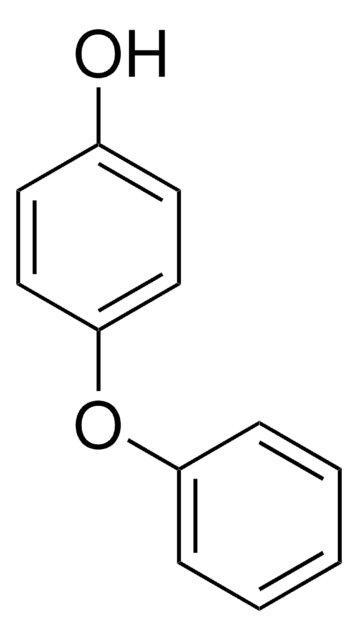All Photos(2)
About This Item
Linear Formula:
C6H5OC6H4OH
CAS Number:
Molecular Weight:
186.21
EC Number:
MDL number:
UNSPSC Code:
12352100
PubChem Substance ID:
NACRES:
NA.22
Recommended Products
Assay
98%
refractive index
n20/D 1.601 (lit.)
bp
185 °C/12 mmHg (lit.)
mp
41-42 °C (lit.)
density
1.159 g/mL at 25 °C (lit.)
SMILES string
Oc1cccc(Oc2ccccc2)c1
InChI
1S/C12H10O2/c13-10-5-4-8-12(9-10)14-11-6-2-1-3-7-11/h1-9,13H
InChI key
HBUCPZGYBSEEHF-UHFFFAOYSA-N
Looking for similar products? Visit Product Comparison Guide
General description
The thermodynamic properties of 3-phenoxyphenol was studied using a combination of effusion and calorimetric techniques and also by high-level ab initio molecular orbital calculations. The standard molar enthalpy of formation of 3-phenoxyphenol was determined using Calvet microcalorimetry.
Signal Word
Warning
Hazard Statements
Precautionary Statements
Hazard Classifications
Acute Tox. 4 Oral - Eye Irrit. 2 - Skin Irrit. 2 - STOT SE 3
Target Organs
Respiratory system
Storage Class Code
10 - Combustible liquids
WGK
WGK 3
Flash Point(F)
235.4 °F - closed cup
Flash Point(C)
113 °C - closed cup
Personal Protective Equipment
dust mask type N95 (US), Eyeshields, Gloves
Choose from one of the most recent versions:
Already Own This Product?
Find documentation for the products that you have recently purchased in the Document Library.
Manuel A V Ribeiro da Silva et al.
The Journal of organic chemistry, 76(10), 3754-3764 (2011-04-14)
Thermodynamic properties of 3- and 4-phenoxyphenol have been determined by using a combination of calorimetric and effusion techniques as well as by high-level ab initio molecular orbital calculations. The standard (p° = 0.1 MPa) molar enthalpies of formation in the
Our team of scientists has experience in all areas of research including Life Science, Material Science, Chemical Synthesis, Chromatography, Analytical and many others.
Contact Technical Service









